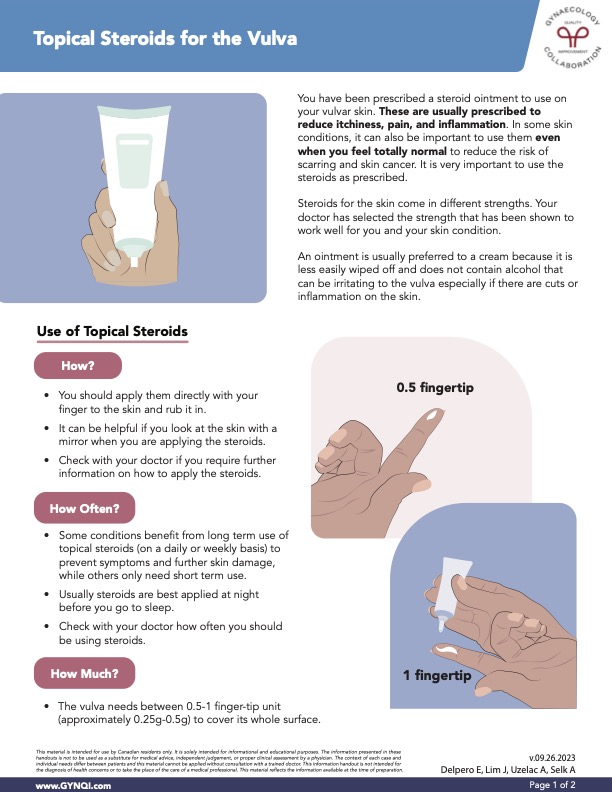
Table of Contents
- Summary
- What Symptoms Do Topical Steroids Treat?
- Just What the Doctor Ordered
- How Do I Use Topical Steroids?
- How Often Should I Use Topical Steroids?
- How Much Steroid Ointment Should I Use?
- Safety of Topical Steroids
- Potential Side Effects of Steroid Ointment
- When To Seek Further Help
- An Active Approach to Treating Skin Conditions of the Vulva
Summary:
- Steroid ointments are prescribed for vulvar skin conditions to reduce itchiness, pain, and inflammation. In some cases, continued use after symptoms improve helps prevent scarring and skin cancer.
- Always use steroids exactly as prescribed by your doctor, as they are available in different strengths and durations. Ointments are preferred over creams because they absorb better and are less irritating to sensitive skin.
- Apply steroids with clean hands, using a mirror for accuracy, and rub them in completely. Consult your doctor if you have any questions or concerns about application frequency or proper use.
- While topical steroids are safe when used as directed, potential side effects can include skin thinning and redness from overuse. Whole-body side effects are rare and only occur with long-term, excessive steroid use.
Topical steroids can be a game-changer when it comes to treating vulvar skin conditions. Whether it’s to reduce itchiness, ease pain, or calm inflammation, these ointments are often prescribed to get your skin back to its healthiest state. In some cases, continuing steroid treatment even after symptoms improve is necessary to avoid scarring and more serious conditions.
It’s essential to follow your doctor’s directions closely to get the best results. Using the ointment correctly and consistently ensures that you’re giving your skin the care it needs without worrying about unnecessary side effects.
What Symptoms Do Topical Steroids Treat?
There are a few reasons why a steroid ointment is prescribed for use on the skin of your vulva.
Steroids are usually prescribed to:
- Reduce itchiness
- Treat symptoms of pain
- Reduce inflammation
In some skin conditions, it’s important to use them even when you feel back to normal. This reduces the potential risk of scarring and in some cases–skin cancer.
Just What the Doctor Ordered
It is very important to use steroids as prescribed. Steroids for the skin come in different strengths, and your doctor has selected the strength best suited for you and your skin condition.
Although there are a few different options, an ointment is generally preferred to a cream steroid as it is less easily wiped off. Creams can contain alcohol, which is irritating to the vulva, especially if there are existing cuts or inflammation on the skin.
How Do I Use Topical Steroids?
To get the most out of your steroid ointment, it’s important to apply it correctly. Be sure to follow the advice of your doctor, and don’t hesitate to ask further questions if needed.
For applying steroids:
- With clean hands, use a finger and apply steroids to the skin
- Use a mirror to ensure you are applying them accurately
- Be sure to rub steroids in completely
Ask your doctor if you need more guidance, they are always there for advice!
How Often Should I Use Topical Steroids?
Some skin conditions only need short-term steroid use. Other conditions may require longer use–on a daily or weekly basis–to prevent ongoing symptoms and further skin damage.
Steroids are best applied at night, right before you go to sleep.
Your doctor will be able to guide you on how often you should be using steroids.
How Much Steroid Ointment Should I Use?
To cover its whole surface, the vulva needs approximately 0.25g to 0.5g of ointment. This is roughly between half and a full fingertip length.
See our helpful guide below:
Safety of Topical Steroids
Applying steroids directly to the skin is a different ball-game from taking them orally, and due to its modified mucosal membranes, the vulva is relatively resistant to side effects from topical steroids. It’s much more important to treat your skin condition, than stress about potential side effects.
Potential Side Effects of Steroid Ointment
There is a lot of concern over the potential side effects of using steroids to treat skin conditions. As long as steroids are being used as prescribed and properly monitored by your doctor, the risk is actually very low.
Skin-specific side effects can include:
- Skin thinning
- Stretch marks
- Redness
Note: These skin-specific side effects happen when using too much ointment over a long period of time.
Whole-body side effects can include:
- Suppressing the body’s natural immune system
- Stress response
Note: These whole-body side effects were observed in people who were using 100g of ultra-potent steroid every week for 1.5 years. You will likely be prescribed much less ointment to use over a shorter period of time.
When To Seek Further Help
It is important to keep an eye on your symptoms, and to let your doctor know if you notice a worsening of symptoms while on the steroid treatment.
Contact your doctor if you experience:
- Worsening of pain, itchiness, or irritation
- Needing more and more steroid to help relieve discomfort
- Cuts that don’t heal with steroids
- Sore hard areas that aren’t improving with steroid use
An Active Approach to Treating Skin Conditions of the Vulva
Topical steroids can be an effective treatment for reducing symptoms associated with vulvar skin conditions. To treat itchiness, pain and inflammation, it’s essential to follow your doctor’s instructions carefully, as they will prescribe the right strength and duration based on your specific needs.
The key to success in treatment lies in proper application and consistency. By using steroids as directed, even when symptoms seem to improve, you can help prevent long-term risks like scarring and skin cancer.
Always consult your doctor if your symptoms worsen or if you have concerns about your treatment.

